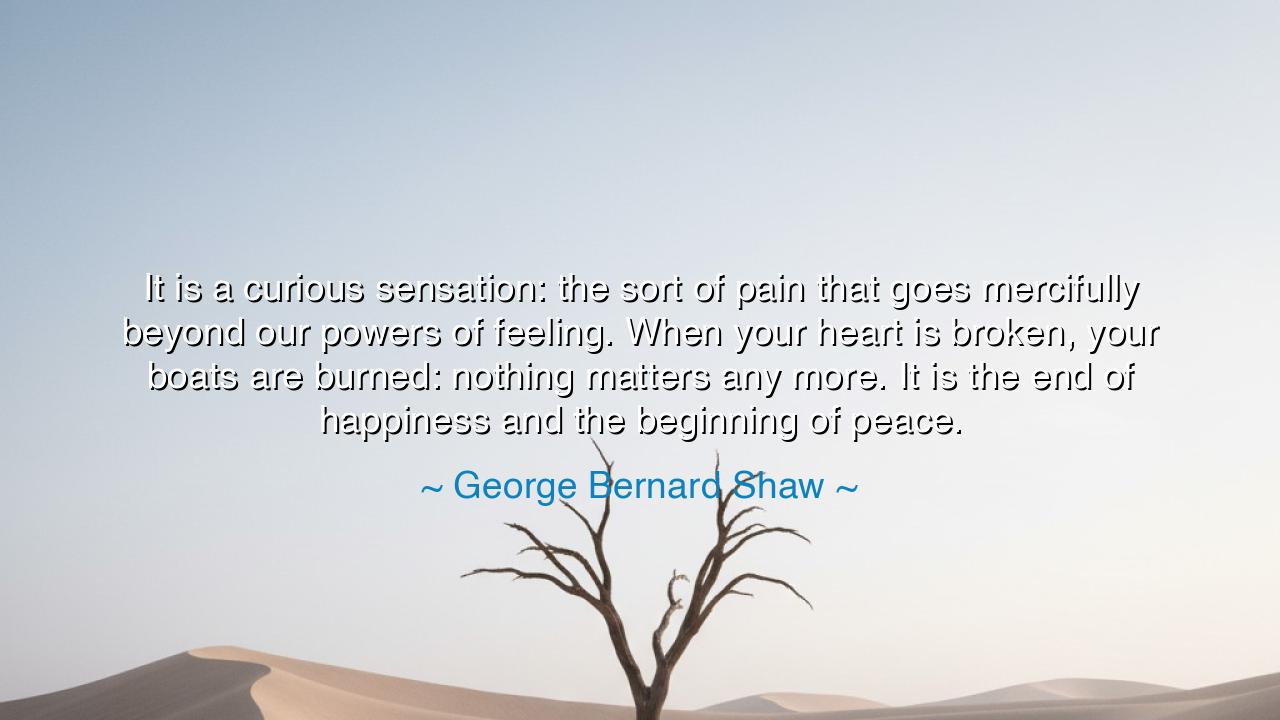
It is a curious sensation: the sort of pain that goes mercifully
It is a curious sensation: the sort of pain that goes mercifully beyond our powers of feeling. When your heart is broken, your boats are burned: nothing matters any more. It is the end of happiness and the beginning of peace.






“It is a curious sensation: the sort of pain that goes mercifully beyond our powers of feeling. When your heart is broken, your boats are burned: nothing matters any more. It is the end of happiness and the beginning of peace.” Thus spoke George Bernard Shaw, the sharp mind and tender philosopher of the human condition. His words reach into the secret chambers of the heart, where grief and wisdom dwell together. They speak of that strange and sacred transformation which follows heartbreak — when the soul, having been shattered, finds not ruin, but release. In this reflection, Shaw reveals that beyond the agony of loss lies not destruction, but a quiet awakening: peace, born from the ashes of what once was joy.
To the unbroken heart, these words may seem dark or distant. Yet those who have loved deeply and lost, who have stood before the wreckage of their own dreams, know their truth. There comes a point when pain stretches beyond the limits of endurance, when tears run dry and the heart — exhausted — surrenders. This is the pain that goes mercifully beyond our powers of feeling, a threshold where suffering dissolves into stillness. It is as if the soul, overwhelmed by the storm, finally falls into the calm at its center. The grief does not vanish; rather, it transforms. What was once burning becomes light — a peace that is not joyous, but serene, vast, and strangely freeing.
Shaw’s metaphor of burned boats carries the weight of finality. In ancient tales, when generals wished to ensure that their soldiers would not retreat, they ordered the ships destroyed. There would be no turning back, only the battle ahead. So it is with the broken heart — when love collapses, when the dream dies, there is no return to what once was. The bridges are gone, the boats burned. The self must move forward, though every step is heavy. Yet in that total loss, paradoxically, lies a kind of power. When there is nothing left to cling to, the spirit stands free. When nothing matters any more, one is liberated from fear, from pretense, from the desperate grasping of desire.
Consider the life of Queen Elizabeth I of England. Her heart was torn between love and duty — between Robert Dudley, the man she cherished, and the crown that demanded her solitude. When she chose her throne over her heart, she sealed her fate in loneliness. Yet out of that heartbreak came a reign of strength and endurance that shaped a nation. Her pain went beyond feeling, and from its ashes rose the peace of purpose. She called herself the “Virgin Queen,” not in chastity alone, but in sovereignty — master of herself, beholden to no one. Her sorrow became her crown.
This is the mystery of human suffering: it can destroy, or it can purify. Shaw tells us that when happiness ends, peace begins — not the peace of contentment, but the peace of surrender. The broken heart learns what the whole heart cannot: that life’s essence is not found in possession or joy, but in acceptance. The one who has endured the fire knows the truth of detachment. The soul, stripped of illusions, no longer seeks to escape pain or to grasp fleeting pleasures. Instead, it learns to dwell in the eternal present, to find quiet strength in being itself.
In this way, heartbreak is a teacher more profound than pleasure. It humbles the proud, softens the stubborn, and opens the eyes of the blind. It reveals that the world, once worshiped for its beauty, is also transient and fragile — and that within that transience lies a strange grace. For when the heart has burned and emptied itself, it becomes like a vessel ready to receive new light. The end of happiness is not the end of life, but a passage to a deeper wisdom — the understanding that peace is not found in what we gain, but in what we let go.
So, dear listener, when you find yourself amid ruin, remember Shaw’s truth: the boats are burned, yes, but perhaps they were never meant to carry you back. Do not curse the fire that consumed them. Let it cleanse you. Let it strip away the illusions that bound you to the shore of what has passed. Stand in the ashes and breathe. Feel the stillness that follows — that strange, tender peace that asks for nothing and fears nothing.
For in the end, the heart that has broken and endured becomes indestructible. It no longer clings to fleeting joys, for it has touched eternity in its pain. The waves may roar, but it stands unmoved. Thus is born the soul that knows true peace — the peace that lies beyond both happiness and sorrow, beyond all that comes and goes, resting forever in the quiet infinity of acceptance.






AAdministratorAdministrator
Welcome, honored guests. Please leave a comment, we will respond soon